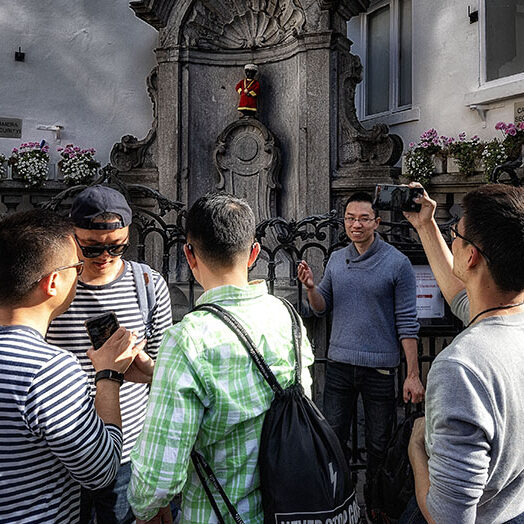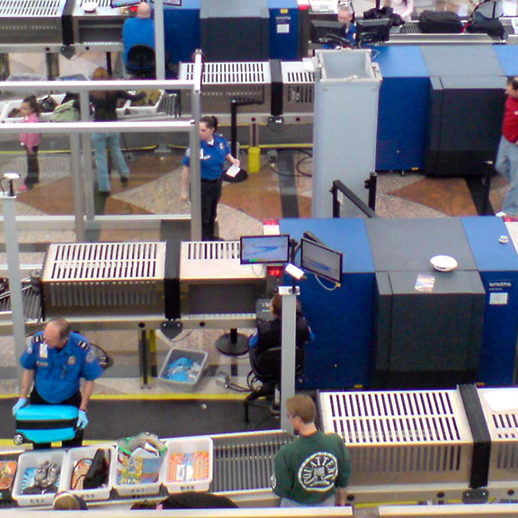This is a flight incident people will remember for a long time.
Cellphone videos taken in an airplane this week have quickly gone viral, as it shows a passenger being forcefully ejected from the plane. United Airlines flight 3411 from Chicago to Louisville on April 9, 2017 boarded its passengers and then announced that four of them must give up their seats to make room for four airline employees who have been described as a “back-up crew”. There were no volunteers among the passengers, even after $800 vouchers were offered, and so United picked four people. One refused to leave and thus was literally dragged off the plane after a scuffle in which he was bloodied and perhaps knocked unconscious.
As I write this, only about five days later, many details are unknown. The outrage against United was near-immediate, and is justified, in my opinion, but from comments people have made, there is a great deal of misunderstanding about the rights that an airline passenger has, at least in the United States. Let’s look at some factors that may affect you on your next flight.
(Note: the information here pertains to flights originating in the USA only. Other countries vary.)

Videos from passengers aboard the flight showed the incident. Screenshots: Tyler_bridges/Twitter
(1) Generally, you must obey the flight attendants. U.S. Federal Aviation Regulations state that “no person may assault, threaten, intimidate, or interfere with a crew member in the performance of the crew member’s duties aboard an aircraft being operated”. They can’t come by and tell you to sit up straight, but they can tell you to close the window shade or put your seat up. As to whether flight attendants have the power to tell you to get off the plane, whether you have to obey that type of commands, the answer legally is yes.
Supposedly, the plane’s captain can expel anyone from the plane for any reason, through a combination of federal aviation regulations, the contract of carriage, and the federal Airline Deregulation Act. You’ll sue them later of course, but right now, you have to go. That’s how they got rid of people wearing leggings or with Arabic writing on their tee-shirts. That’s how they can throw someone off a plane. Once they say move and you say no, you’re in violation. It perhaps isn’t right, but it’s legal.
If the plane is in the air, and they decide you’re disobedient enough, there will be local police waiting for you at the gate when you land. Disobeying a crew member is treated as a safety issue, and once that happens, immediately the plane turns into an authoritative license.

The 1980 movie “Airplane!” accurately depicted the proper way to handle passengers.
(2) Your plane ticket doesn’t guarantee you a seat. Your ticket is a contract between you and the airline, called “Contract of Carriage”, but have you ever read that contract? (United’s is here) The only more one-sided contract you may deal with in traveling is with your rental car company. In order to do business with either one, you auto-agree to their rules, and you’d best understand those rules gives them tremendous latitude. It doesn’t matter what you think is fair. One part of United’s contract says, about overbooking, “If there are not enough volunteers, other Passengers may be denied boarding involuntarily in accordance with UA’s boarding priority.” There you go.
Your ticket also doesn’t guarantee you a time. A contract of carriage can clearly state that the flight time is not guaranteed and can change. After I bought tickets last year to fly from the USA to Asia, American Airlines changed the departure time of the first flight from 8:30 a.m. to 5:30 a.m. Later in that same trip, Hong Kong Airlines changed my flight out of Bangkok from 11:00 a.m. to 3:00 p.m.
If the flight time undergoes a “significant change”, and the definition of this varies by airline (usually over a few hours), you can get a refund of the ticket price. But then you don’t have a ticket anymore. I had to suck up those time changes or start all over again.
As for the seat you choose, the contract of carriage states that it can be changed without notice. You have no rights to your desired seat. If a crew member says “move” from your front aisle seat to a back middle seat, you have to move.
There are a dozen other reasons an airline can refuse to let you on board. If you’re barefoot, or smelly. Or appear intoxicated. Or are too overweight to fit into a seat. Or are clothed in a way that might be offensive to others. Good luck with that last one.

(Airplane! screenshot)
(3) Your plane ticket doesn’t guarantee you passage. Perhaps you’re not getting on the flight you want at that certain time, but they still have to get you there, yes? No. They can cancel your ticket under certain situations. They have to refund the purchase price of course, but then you’re stuck. You can buy a ticket with someone else of course, paying their current price, which for same-day travel would be outrageous.
In most cases, the airline wants to get you there, of course. They have an obligation to put you on the next available flight, but no obligation to put you on another airline that’s leaving sooner. The next available flight could be 24 hours from now, or more.
Flights can be delayed or even canceled, and the airline has no legal obligation to provide extra compensation (such as a hotel or food voucher). They just have to put you on the next flight. Being bumped from an oversold flight is the only specific scenario where compensation is spelled out in federal law. Airlines make their own guidelines about other compensation (Note: the EU has different rules about this). That said, it’s always worth asking about hotel/meal vouchers, but it can be up to the mood of the gate agents, so be nice.
(4) Overbooking is legal and it can affect you. It appears that the United flight was not overbooked—that it was simply full and four crew members showed up who needed seats, after everyone was boarded. Crew member situations like this have traditionally counted towards overbook status, and that could be the legalese that decides this case.
Still, airlines are allowed to oversell their flights, thus all but guaranteeing some people will be bumped. In 2015, according to the U.S. Department of Transportation, 46,000 passengers were bumped. If your plans are somewhat flexible and you want to save money on your next flight, ask at the gate if the flight is oversold, and tell them you’ll volunteer to be bumped. If you are needed, you’ll receive a travel voucher for a certain amount and will be placed on the next available flight, which may not be soon. You have to bargain with them. Don’t settle for less than $400 (start the bidding at $1000, really), and get it in an e-voucher, not a paper voucher that you have to use directly at the airport. I learned this the hard way. Don’t settle for multiple vouchers that can’t be combined.
Increasingly, airlines are paying out more for bumping. The days when a passenger would voluntarily delay their vacation for a lousy $200 are over. And remember, this is a voucher towards future travel, not cash. It’s only good for a year, and only good for that airline. You may fly United within the next year, or not. You have to book it through their website, not on Expedia or Kayak or Hipmunk or any other travel site, meaning you may not get the best deal or the times/route you want.
About seven years ago, Virgin Nigeria gave me a $400 voucher for a missed flight from Lagos to Accra. “Good for the next time you come back to Nigeria!” the woman told me. I haven’t been back. Another case: last year I got a $500 voucher from American Airlines, and used it on a flight to Portugal. That ticket was $1400, where I could have one closer to $1100 or $1200 through other airlines. Still a net savings, but not a $500 savings.
It’s not just the overbooking that inconveniences you. Airlines try many techniques to get their planes as full as possible, including changing to smaller planes, which is why the overall number of flights has gone up but average load has gone down. When was the last time you were on a flight that wasn’t very, very full?
That said, the process of picking people to be booted isn’t random. Minors and disabled people aren’t booted, and neither is the military. This isn’t the first time I’ve thought of buying a fake army uniform and pretending to be a soldier to get preferential treatment. Airlines take into account mileage status of passengers, and perhaps even the fare code. If you’re a healthy non-soldier traveling on a dirt-cheap ticket without a frequent flyer account with them, watch it.

The media was quick to mock. From Jimmy Kimmel Live!
(5) Outrage against United is justifiable, but what would be better is clarification, and an enhancement, of the limited rights we have as passengers. The man dragged off the plane, just because he was in an airport, already had his luggage and person subject to an unreasonable search. He may have had his body x-rayed so that some anonymous TSA agent could see him naked, to ensure he’s not a terrorist, because everyone is a suspect now. He probably stood in at least three lines for an hour or more waiting to be inconvenienced, to be searched and possibly prodded by the TSA who have been granted the right to run their hands all over your body if they feel it’s needed. The passenger’s checked luggage (for which he most likely paid $25 additional to check) was still on the plane, and thus he would have needed to be reconnected with it, later. Perhaps much later. Passengers are simply treated badly.
United CEO Oscar Munoz released an initial statement about the incident, saying “Our employees followed established procedures for dealing with situations like this.” I have no doubt that’s true, but the established procedure was to label the passenger “disruptive and belligerent” and to call the Chicago Aviation Police, who decided to use force.

Twitter was even quicker to mock. (@pzambrana)
So what does it all mean?
Passengers need a clearer, firmer bill of rights. In the U.S, here are your current rights: if you’re bumped from a flight involuntarily and the airline can get you to your destination on another flight within one hour of your original time, you receive no compensation. If it’s between one to two hours later, you’re entitled to double the one-way fare of that flight, up to $675. If it’s more than two hours (or four hours for an international flight), you’re entitled to four times the price, up to $1,350.
Remember, this is for being bumped involuntarily. This is also cash settlement, not a voucher. If you’re bumped involuntarily, do not accept a voucher; ask for cash. If you voluntarily give up your seat, such as when the gate crew announced that they’re overbook and are looking for volunteers, you have to negotiate with the airline itself, and there are no rules. Try for cash, but they’ll want to give you a voucher.
If you get bumped involuntarily, always ask for a written list of your entitlements. They must provide you one.
It’s been enough days after the United incident where we’re now seeing the backlash, the people calling the passenger a whiner and bringing up his past transgressions and reminding us that the airline did nothing legally wrong and that the passenger should have just followed the rules. We should all know our rights and our legal limits, and then we should admit that the airline has too much power and that this situation never should have turned physical.

Air travel has never been easy. (screenshot, North By Northwest)
We need a balance between the authoratative system of an aircraft and decency. It’s fairly established that an aircraft can kick you off for any reason, but airlines have forgotten that there are reasons why they shouldn’t. Anyone trained in customer service would have been alarmed by the idea of yanking four already-seated paying customers in favor of employees. Any trained law enforcement should have been alarmed at physically removing a person in a non-emergency situation. We need guidelines about when physical force can be employed.
Don’t argue with the flight crew or the aviation cops. You’ll almost always lose, even if you win the public opinion. The way to win an argument with them is in court, not on the spot. For selfish reasons, we may be glad, on a certain level, that the passenger stood up for himself and brought attention to this issue. But the guy got beat up and traumatized. I wonder he feels noble now for taking his stand.
United Airlines is allowed to call The Man to enforce their rules. These are publicly-funded authorities, called upon to enforce a private company’s policy against a paying passenger in a non-emergency situation. Are passengers also allowed to do this? The people who pulled him off the plane were not the regular Chicago city police; they were the Chicago Aviation Police, utterly separate, under the control of the Chicago Department of Aviation, the administrative body of Chicago’s two airports, but funded by public tax dollars. The reaction to this was usually, “Who are these guys?” Imagine the passenger’s eventual lawyer questioning them: “And exactly what authority and guidelines do you have to use physical force? And what kind of training did you receive on it?”
For smaller incidents that don’t go viral, we passengers need a complaint system with teeth. You can complain to the airline directly, but in the U.S., there’s a better option: the airline may not care about you, but you can complain directly to the government through a form here.
(Once again, the information here only pertains to flights originating in the USA. Other countries vary. Read the USA Department of Transportation consumer guide to air travel here, and the EU guide to air passenger rights here.)














I think it was a horrific abuse of their authority – my understanding is that the right to deny boarding for overbooking does not apply once a passenger has been ticketed and allowed to board. Not to mention that they had other avenues open to them including offering a much higher incentive to find passengers willing to give their seats up, they didn’t even reach their own maximums. Their policy seems to give little attention to customer care and that was underlined by the first statement from their CEO, referring to the problem of re-accommodating passengers. Horrible all round. But yes, agree that it would be great for consumers to have better clarity on their rights and obligations.
Really interesting read – I agree that passengers need to know their rights better, and have more rights to start with…
I see (all of) your point but I feel like so much is riding on those flights, that you’d think that double booking wouldn’t be allowed.
Extra points for the use of Airplane and North by Northwest screenshots. As a total side note, in Australia, it’s not called Airplane for some reason. It’s called Flying High.
Catching up with this article a bit late, but it is a nice recap of the facts surrounding this incident. I was just surprised how the airline didn’t know about the back up crew until they boarded all the passengers. The situation could have certainly been handled less dramatically at the gate.
Insights, insights and more insights. This is an extremely educative post. Just makes me realise again how comforting a state of being well-informed can be.
It is 100% not fair, but it’s true. There is fine print we choose to ignore in almost everything we agree too, especially when booking airline tickets. Luckily, I have never had an issue, but that being said I have never read the terms when purchasing a plane ticket. I hope too that this event with United will cause a push for airlines to have clearer more fair terms and that people finally read the fine print before they agree to anything!
What an interesting post! I didn’t know all that and this is a great informative article! Loved reading it 🙂
I think I have said and seen a lot on social media about this…to be frank, its getting boring now. I just hope that passenger who got roughed up gets what he deserves and a big shake up in United Airlines customer service is needed.
The treatment of this poor passenger was beyond the pale. But I think it’s highlighted to the public that they don’t have as many rights as they thought. Hopefully airlines will be a lot more transparent about their procedures from now on.
Thank you for doing all this research, super useful information!
Great post. It never occurred to me how much of a risk we all take when we buy a plane ticket. I see why some people prefer to cruise and leave from the port instead of flying. Its way to much of a hassle to buy a ticket and then risk getting thrown off your flight.
It sounds like people assume they have more rights than they actually do. I think people forget sometimes that they have to go by the rules and regulations that are covered in the contract they agreed to with the airline. Most people don’t read contracts before signing them in my experience. It was ridiculous the way it all went down though.
I certainly advise people in this article to be aware of the rules, but I still question the contract and the rules, and am glad this passenger did as well.
Very informative read and explanation of the situation. Truth is, most of us have no idea what are our rights when buying a ticket and flying and airline industry is really specific. However, whether this man was right or wrong, what happened to him was terrible and sad to see. Hopefully it won’t happen again!
The post is very informative. Most of the facts presented in the post are all new information for me.
Didn’t know that overbooking is legal?! I mean, you can never be certain that you’re good to go than, since it’s not up to you, and there’s nothing you can do apparently to ensure your flight. And you’re paying for it. Ridiculous, isn’t it! 🙂
Thanks for the great insights on the entire past incidence! I certainly believe that United Airlines should have had handled the entire situation with less drama and without physically hurting the passenger!
Lots of commotion about this whole United Airlines situation. Just ridiculous how they handled the situation, they should have done it with less force. As an ex travel agent myself i know the fine print and the rights of the passenger and the airline, and I think a lot of passengers have no idea of their rights, or get ripped of with a lower compensation than they actually can get.